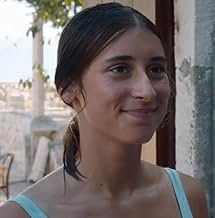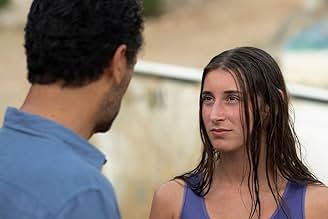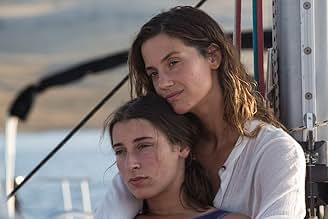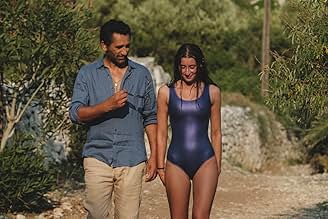Murina
- 2021
- Tous publics
- 1h 36m
IMDb RATING
6.8/10
3.7K
YOUR RATING
A teenage girl decides to replace her controlling father with his wealthy foreign friend during a weekend trip to the Adriatic Sea.A teenage girl decides to replace her controlling father with his wealthy foreign friend during a weekend trip to the Adriatic Sea.A teenage girl decides to replace her controlling father with his wealthy foreign friend during a weekend trip to the Adriatic Sea.
- Awards
- 10 wins & 19 nominations total
Featured reviews
Writer/Director Antoneta Alamat Kusijanovic's debut feature is all it could be from a director who also used to dive in the film's idyllic Croatian coast setting.
This films builds on the director's underwater camera work in her enjoyable short Into the Blue (2017), and in acting and screen presence of actress Gracija Filipovic. This feature was in fact written with this teenage actor/non-actor in mind after the short. Gracia was 12 yr old then and showed promise and shines 4 years later in this character study.
The story has strong writing as it tackles teenage rebellion, family and relationship dynamics with evolving dreams of love, sexuality, freedom and purpose.
The father, mother and daughter relationships are complicated in this small village and when a wealthy, well-travelled long-time friend comes to spend some time with the family, much is revealed of the desires and dissatisfactions of all three family members.
The directing, cinematography and editing of this evolving drama are so strong that every shot of the 96 min movie is a pleasure. The acting is nuanced and elevated from the four leads. The underwater shots are beautiful and tell the story with images, sounds and occasional music. The first and final long shots of the movie tell a tight story visually that induce emotions viscerally and intellectually.
It is no surprise that the film won Camera d'Or at Cannes and over 20 other awards in 65 film festival worldwide.
Looking forward to Antoneta's next film which centers on a mother and daughter relationship and perhaps also catching some of her previous shorts, including If We Must Die (2016).
In short, this is a melancholic, beautiful drama with stunning cinematography and deft directing. A simple story with substance. Highly recommended.
This films builds on the director's underwater camera work in her enjoyable short Into the Blue (2017), and in acting and screen presence of actress Gracija Filipovic. This feature was in fact written with this teenage actor/non-actor in mind after the short. Gracia was 12 yr old then and showed promise and shines 4 years later in this character study.
The story has strong writing as it tackles teenage rebellion, family and relationship dynamics with evolving dreams of love, sexuality, freedom and purpose.
The father, mother and daughter relationships are complicated in this small village and when a wealthy, well-travelled long-time friend comes to spend some time with the family, much is revealed of the desires and dissatisfactions of all three family members.
The directing, cinematography and editing of this evolving drama are so strong that every shot of the 96 min movie is a pleasure. The acting is nuanced and elevated from the four leads. The underwater shots are beautiful and tell the story with images, sounds and occasional music. The first and final long shots of the movie tell a tight story visually that induce emotions viscerally and intellectually.
It is no surprise that the film won Camera d'Or at Cannes and over 20 other awards in 65 film festival worldwide.
Looking forward to Antoneta's next film which centers on a mother and daughter relationship and perhaps also catching some of her previous shorts, including If We Must Die (2016).
In short, this is a melancholic, beautiful drama with stunning cinematography and deft directing. A simple story with substance. Highly recommended.
Adolescence is a time for finding oneself, especially when it comes to our sense of personal power. That's rarely easy, but it can be especially difficult for a teenage girl trapped in a household with a chauvinistic father, a condition not uncommon in many traditional Eastern European households. Such is the fate of a quiet but independently minded Croatian adolescent who longs for freedom from under the thumb of her domineering dad and capitulating mother. But the potential for profound change arises when a wealthy old friend of her father pays a visit to their coastal fishing village, one that could transform her life and that of her mother, provided they have the courage to act on it. Director Antoneta Alamat Kusijanovic's debut feature from Executive Producer Martin Scorsese presents an intense, intimate character study of an individual's search for empowerment in the face of oppressing odds and confusing circumstances that, like the clandestine behavior of the moray eels she and her father routinely hunt, deceptively conceal much of what's actually going on. This winner of the 2021 Cannes Film Festival Golden Camera Award for best first feature simmers slowly but builds tension well, engaging viewers handily, despite some repetitive narrative elements and occasional "atmospheric" camera work whose deliberate murkiness goes a little overboard in metaphorically depicting the intended character of the story. A number of films with themes similar to those explored here have emerged from this region in recent years, such as "Hive" (2021) and "God Exists, Her Name is Petrunya" (2019). That's an indication that there's a need for the expression of these notions, and, thankfully, filmmakers have successfully risen to the occasion, making the world more aware about conditions for women desperately in need of reform.
Cowriter (with Frank Graziano)/director Antoneta Alamat Kusijanovic's Camera d'or winning feature debut recharges the coming-of-age story with multi-generational sexual heat and a constant threat of danger in a sun-splashed, Adriatic setting. Before the man Ante describes as 'god on earth' arrives, Julija dutifully accompanies her father to spearfish for the titular eels before returning to her room where she watches vacationing teenagers flirt on a yacht below her window.
When she's not capturing the sparkling sea and dramatic underwater scenes, cinematographer Hélène Louvart ("The Lost Daughter") uses angles like these to add weight to the viewer's point of view - Murina will look down again from a height at a very different type of flirting (and we will gaze up at her, a statuesque sea nymph in an aqua one piece). There will also be tight spaces promising danger, like the rocks Ante recklessly pilots a boat through or the underwater crevice Julija risks for an escape.
Then Javier arrives and he appears to be everything Ante is not, appreciative of the women's beauty, encouraging Julija to expand her dreams and think of going to Harvard. Javier's attentions make Julija bolder and Ante angrier. Julija tells Nela that Javier is obviously in love with her and that they should leave with him, but the older beauty knows better. Afraid that his daughter's rebellious behavior will sink his business deal, Ante does what she's been accusing him of wanting to do, literally locking her up in a boathouse. The man needs to watch his back.
Kusijanovic counters sensuality with tension throughout, accentuated by the tautly vibrating violins of "Loveless" composers Evgueni and Sasha Galperine. The overlapping interplay of two sets of three, the dysfunctional family and the flirtatious love triangle, is beautifully acted, Filipovic wordlessly displaying mercurial emotions between the extremes of Lucev and Curtis. "Murina" is a bold and beautiful expression of one young woman's bolt for freedom.
When she's not capturing the sparkling sea and dramatic underwater scenes, cinematographer Hélène Louvart ("The Lost Daughter") uses angles like these to add weight to the viewer's point of view - Murina will look down again from a height at a very different type of flirting (and we will gaze up at her, a statuesque sea nymph in an aqua one piece). There will also be tight spaces promising danger, like the rocks Ante recklessly pilots a boat through or the underwater crevice Julija risks for an escape.
Then Javier arrives and he appears to be everything Ante is not, appreciative of the women's beauty, encouraging Julija to expand her dreams and think of going to Harvard. Javier's attentions make Julija bolder and Ante angrier. Julija tells Nela that Javier is obviously in love with her and that they should leave with him, but the older beauty knows better. Afraid that his daughter's rebellious behavior will sink his business deal, Ante does what she's been accusing him of wanting to do, literally locking her up in a boathouse. The man needs to watch his back.
Kusijanovic counters sensuality with tension throughout, accentuated by the tautly vibrating violins of "Loveless" composers Evgueni and Sasha Galperine. The overlapping interplay of two sets of three, the dysfunctional family and the flirtatious love triangle, is beautifully acted, Filipovic wordlessly displaying mercurial emotions between the extremes of Lucev and Curtis. "Murina" is a bold and beautiful expression of one young woman's bolt for freedom.
I found the father figure infuriating, but it provoked such a strong reaction. Its a movie about family strife, and it does that very well. Also, the will to overcome adversity in adolescence. Settings beautiful and acting was impressive.
I enjoyed this film. The picture and scenery looked stunning. The acting was pretty good overall.
But at the same time, I felt this film lacked proper character development, given its subject. The story is about a controlling father and his relationship with his daughter and our main hero Julija. But here is the thing - Julija is shown as very much her own person right from the start. She has a no-nonsense attitude and is happy to tell-off anyone (including her father) whenever she feels like it. If anything, at times it felt like her mother was actually the controlling parent with her constant remarks ("please wear this dress", "please don't speak" and so on).
Since Julija was in command from the start, the whole climax of the film felt rather pointless, or at least disengaging. We already knew she was independent.
But at the same time, I felt this film lacked proper character development, given its subject. The story is about a controlling father and his relationship with his daughter and our main hero Julija. But here is the thing - Julija is shown as very much her own person right from the start. She has a no-nonsense attitude and is happy to tell-off anyone (including her father) whenever she feels like it. If anything, at times it felt like her mother was actually the controlling parent with her constant remarks ("please wear this dress", "please don't speak" and so on).
Since Julija was in command from the start, the whole climax of the film felt rather pointless, or at least disengaging. We already knew she was independent.
Did you know
- GoofsCliff Curtis is Maori. His character Javier is supposed to be Latino but in scenes where Javier is shirtless or wear shorts you can see Cliff's Maori tribe tattoos.
- ConnectionsReferenced in Film Junk Podcast: Episode 879: M3GAN (2023)
- How long is Murina?Powered by Alexa
Details
- Release date
- Countries of origin
- Official sites
- Languages
- Also known as
- 湛藍青春海
- Filming locations
- Kornati National Park, Croatia(general setting)
- Production companies
- See more company credits at IMDbPro
Box office
- Gross US & Canada
- $55,762
- Opening weekend US & Canada
- $6,036
- Jul 10, 2022
- Gross worldwide
- $408,213
- Runtime
- 1h 36m(96 min)
- Color
- Aspect ratio
- 2.35 : 1
Contribute to this page
Suggest an edit or add missing content





























